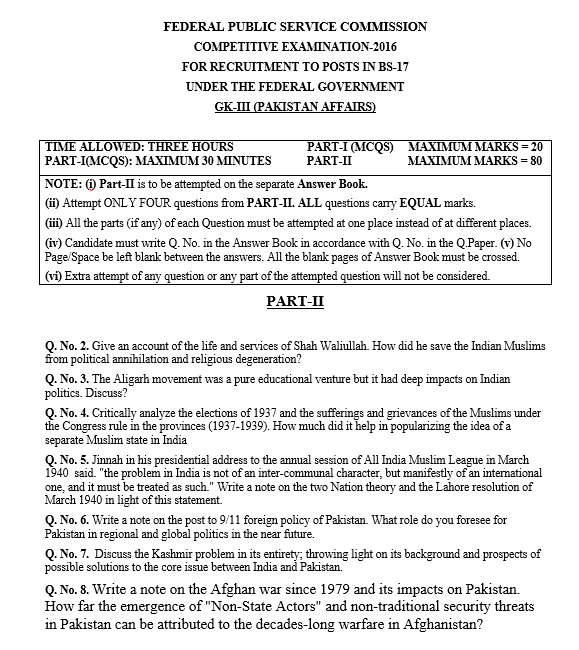CSS Pakistan Affairs Paper 2016
No. 2. Give an account of the life and services of Shah Waliullah. How did he save the Indian Muslims from political annihilation and religious degeneration?
No. 3. The Aligarh movement was a pure educational venture but it had deep impacts on Indian politics. Discuss?
No. 4. Critically analyze the elections of 1937 and the sufferings and grievances of the Muslims under the Congress rule in the provinces (1937-1939). How much did it help in popularizing the idea of a separate Muslim state in India
No. 5. Jinnah in his presidential address to the annual session of All India Muslim League in March 1940 said. “the problem in India is not of an inter-communal character, but manifestly of an international one, and it must be treated as such.” Write a note on the two Nation theory and the Lahore resolution of March 1940 in light of this statement.
No. 6. Write a note on the post to 9/11 foreign policy of Pakistan. What role do you foresee for Pakistan in regional and global politics in the near future.
No. 7. Discuss the Kashmir problem in its entirety; throwing light on its background and prospects of possible solutions to the core issue between India and Pakistan.
No. 8. Write a note on the Afghan war since 1979 and its impacts on Pakistan. How far the emergence of “Non-State Actors” and non-traditional security threats in Pakistan can be attributed to the decades-long warfare in Afghanistan?
Summary of Questions
No. 2. Give an account of the life and services of Shah Waliullah. How did he save the Indian Muslims from political annihilation and religious degeneration?
Shah Waliullah was a renowned Islamic scholar and reformer of the 18th century. He worked to revive Islamic teachings and unify Indian Muslims against political and religious decline. His efforts included translating the Quran into Persian and addressing socio-religious issues of the Muslim community. Shah Waliullah’s leadership and reforms helped preserve Muslim identity during a time of political instability and cultural decline in India.
No. 3. The Aligarh movement was a pure educational venture but it had deep impacts on Indian politics. Discuss.
The Aligarh Movement, initiated by Sir Syed Ahmad Khan, focused on modern education for Indian Muslims, promoting scientific and Western learning alongside Islamic values. Although primarily educational, it shaped Indian politics by creating an informed Muslim elite, advocating for communal harmony, and fostering a political consciousness that later contributed to the demand for a separate Muslim state.
No. 4. Critically analyze the elections of 1937 and the sufferings and grievances of the Muslims under the Congress rule in the provinces (1937-1939). How much did it help in popularizing the idea of a separate Muslim state in India?
The 1937 elections brought the Indian National Congress to power in several provinces, where Muslims faced discrimination, cultural suppression, and economic marginalization. Policies under Congress rule alienated Muslims and fueled grievances, highlighting their political insecurity. These experiences played a pivotal role in strengthening the demand for Pakistan, popularizing the idea of a separate Muslim state.
No. 5. Jinnah in his presidential address to the annual session of All India Muslim League in March 1940 said, “the problem in India is not of an inter-communal character, but manifestly of an international one, and it must be treated as such.” Write a note on the two Nation theory and the Lahore resolution of March 1940 in light of this statement.
Jinnah’s address emphasized the Two-Nation Theory, asserting that Hindus and Muslims were distinct nations with separate religions, cultures, and political aspirations. The Lahore Resolution of March 1940 formally demanded independent states for Muslims, laying the foundation for the creation of Pakistan. This shift reframed India’s communal issue as a matter of national self-determination.
No. 6. Write a note on the post-9/11 foreign policy of Pakistan. What role do you foresee for Pakistan in regional and global politics in the near future?
Post-9/11, Pakistan aligned with the U.S.-led War on Terror, becoming a key ally in combating terrorism but facing domestic challenges like instability and extremism. Pakistan’s foreign policy seeks balance between global partnerships and regional interests. In the future, Pakistan could play a significant role in peace efforts in South Asia and as a mediator in geopolitical conflicts.
No. 7. Discuss the Kashmir problem in its entirety; throwing light on its background and prospects of possible solutions to the core issue between India and Pakistan.
The Kashmir conflict began with the partition of 1947, as both India and Pakistan claimed the region. Rooted in political, religious, and territorial disputes, it has led to wars and prolonged instability. Solutions include bilateral dialogue, international mediation, or granting self-determination to the Kashmiri people, but mistrust between the nations hampers progress.
No. 8. Write a note on the Afghan war since 1979 and its impacts on Pakistan. How far the emergence of “Non-State Actors” and non-traditional security threats in Pakistan can be attributed to the decades-long warfare in Afghanistan?
The Afghan war of 1979 brought significant challenges for Pakistan, including an influx of refugees, arms, and militant ideologies. The prolonged conflict fostered the rise of non-state actors and extremist groups, destabilizing Pakistan’s security. These issues, coupled with non-traditional threats like terrorism, remain a legacy of decades-long instability in Afghanistan.
